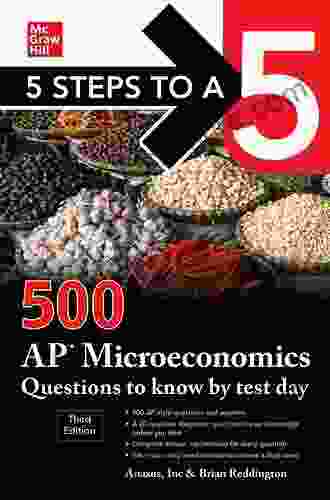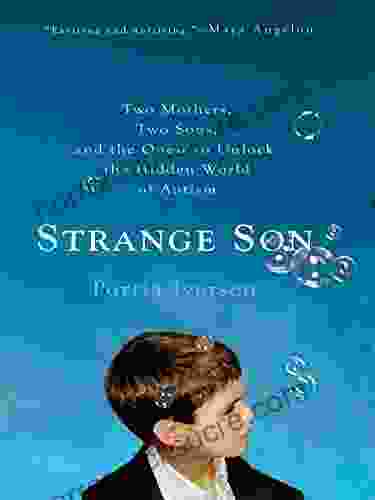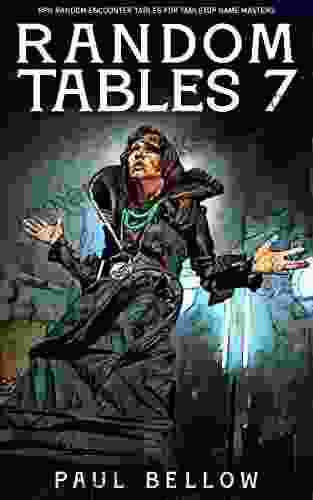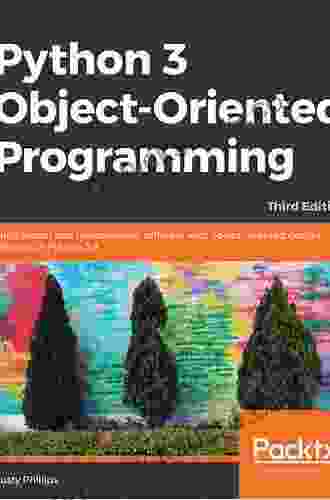Unveiling Python's Object-Oriented Programming Prowess: A Comprehensive Guide to Its Powerful Features

Python, an esteemed high-level programming language renowned for its versatility and beginner-friendliness, boasts a robust object-oriented programming (OOP) paradigm that empowers developers to create intricate and maintainable code. OOP revolves around the concept of objects, entities that encapsulate both data and functionality within them. This design philosophy mimics the real-world, where entities possess both attributes (data) and behaviors (functions).
4.6 out of 5
| Language | : | English |
| File size | : | 36779 KB |
| Text-to-Speech | : | Enabled |
| Screen Reader | : | Supported |
| Enhanced typesetting | : | Enabled |
| Print length | : | 2591 pages |
Classes and Objects
At the heart of OOP lies the concept of classes. A class serves as a blueprint for creating objects, defining their attributes and methods. Objects, instances of a class, contain specific values for the defined attributes and can invoke the methods associated with the class.
Consider a simple example of a `Person` class:
python class Person: def __init__(self, name, age): self.name = name self.age = age
def get_name(self): return self.name
def get_age(self): return self.age
In this class, the constructor `__init__` initializes two attributes, `name` and `age`, upon object creation. Additionally, getter methods `get_name` and `get_age` are defined to retrieve the respective attribute values.
To create an object, we instantiate a class with specific values:
python person1 = Person("John Doe", 30)
Here, `person1` is an object with attributes `name` and `age` set to "John Doe" and 30, respectively. We can access these attributes using the getter methods:
python print(person1.get_name()) # Output: John Doe print(person1.get_age()) # Output: 30
Inheritance
OOP's inheritance mechanism enables the creation of new classes (child classes) from existing classes (parent classes),inheriting their attributes and methods while extending or modifying them. This promotes code reusability and facilitates the organization of related classes.
For instance, we can create a `Student` class that inherits from the `Person` class:
python class Student(Person): def __init__(self, name, age, grade): super().__init__(name, age) self.grade = grade
def get_grade(self): return self.grade
The `Student` class inherits the attributes `name` and `age` from the `Person` class and adds a new attribute `grade`. It also defines a method `get_grade` to retrieve the student's grade.
Inheritance allows us to create new classes with minimal code duplication, leveraging the functionality of existing classes while customizing them as needed.
Polymorphism
Polymorphism, a fundamental principle of OOP, grants objects of different classes the ability to respond to the same message in unique ways. This is achieved through method overriding, where child classes provide their own implementation of inherited methods.
Consider this example:
python class Animal: def make_sound(self): print("Generic animal sound")
class Dog(Animal): def make_sound(self): print("Woof!")
class Cat(Animal): def make_sound(self): print("Meow!")
In this hierarchy, the `Animal` class defines a method `make_sound` that prints a generic animal sound. The child classes `Dog` and `Cat` override this method, providing their own specific sounds.
This enables polymorphic behavior, where objects of different classes can respond differently to the same method call:
python dog = Dog() cat = Cat()
dog.make_sound() # Output: Woof! cat.make_sound() # Output: Meow!
Encapsulation
Encapsulation, a cornerstone of OOP, promotes data hiding and access control, ensuring that sensitive data remains protected from external modification. It is achieved through the use of private class attributes, accessible only within the class itself.
In Python, private attributes are prefixed with double underscores (`__`). For instance:
python class Account: def __init__(self, balance): self.__balance = balance
def get_balance(self): return self.__balance
def withdraw(self, amount): if amount Real-World Applications
Python's OOP capabilities find widespread application in diverse domains, including:
- Game Development: OOP facilitates the creation of complex game objects with attributes and behaviors.
- Web Development: Django and Flask frameworks leverage OOP for building dynamic web applications.
- Data Science: OOP enables the organization and manipulation of large datasets using objects and classes.
- Machine Learning: OOP provides a structured approach for creating and training machine learning models.
- Operating Systems: OOP is employed in operating systems to model processes, memory management, and file systems.
Python's object-oriented programming paradigm stands as a powerful tool for structuring and managing complex code. Through the concepts of classes, inheritance, polymorphism, and encapsulation, Python empowers developers to create maintainable, reusable, and extensible software solutions. Whether it's building interactive games, dynamic web applications, or advanced machine learning models, Python's OOP capabilities prove invaluable across a wide spectrum of real-world applications.
4.6 out of 5
| Language | : | English |
| File size | : | 36779 KB |
| Text-to-Speech | : | Enabled |
| Screen Reader | : | Supported |
| Enhanced typesetting | : | Enabled |
| Print length | : | 2591 pages |
Do you want to contribute by writing guest posts on this blog?
Please contact us and send us a resume of previous articles that you have written.
 Fiction
Fiction Non Fiction
Non Fiction Romance
Romance Mystery
Mystery Thriller
Thriller SciFi
SciFi Fantasy
Fantasy Horror
Horror Biography
Biography Selfhelp
Selfhelp Business
Business History
History Classics
Classics Poetry
Poetry Childrens
Childrens Young Adult
Young Adult Educational
Educational Cooking
Cooking Travel
Travel Lifestyle
Lifestyle Spirituality
Spirituality Health
Health Fitness
Fitness Technology
Technology Science
Science Arts
Arts Crafts
Crafts DIY
DIY Gardening
Gardening Petcare
Petcare Sanjay Gupta
Sanjay Gupta Lisa Rene Reynolds Phd
Lisa Rene Reynolds Phd Joel Hooks
Joel Hooks Molly Hurford
Molly Hurford Declan Lyons
Declan Lyons Octavia Steen
Octavia Steen Tony Frezza
Tony Frezza John D Barrow
John D Barrow Jo Carol Claborn
Jo Carol Claborn Kevin Johnson
Kevin Johnson Michael S Kelly
Michael S Kelly Greg Schwipps
Greg Schwipps Catherine Faherty
Catherine Faherty Department Of The Army
Department Of The Army Jeremy Griffith
Jeremy Griffith John Branch
John Branch C C Hunter
C C Hunter Tim Tebow
Tim Tebow Graham Burgess
Graham Burgess Bertrand Russell
Bertrand Russell Christy Teglo
Christy Teglo Deborah Blum
Deborah Blum Benjamin Southerland
Benjamin Southerland Stanley Cohen
Stanley Cohen Daniel Muijs
Daniel Muijs Malin Gutestam
Malin Gutestam Ben Worthington
Ben Worthington Paul Dolan
Paul Dolan Stephanie Baier
Stephanie Baier Emma Walker
Emma Walker Valentin Nugmanov
Valentin Nugmanov Gerad Kite
Gerad Kite Lou Kasischke
Lou Kasischke Daniel Boyarin
Daniel Boyarin Suzanne Bender
Suzanne Bender Bernardo Kastrup
Bernardo Kastrup John Dickie
John Dickie Bill W
Bill W Jill H Rathus
Jill H Rathus Naomi Steiner
Naomi Steiner Jenson Button
Jenson Button Knowledge Flow
Knowledge Flow Leia Stone
Leia Stone Simon Armitage
Simon Armitage Christy Mihaly
Christy Mihaly Steve Schwartz
Steve Schwartz Rachael Denhollander
Rachael Denhollander David Estes
David Estes Chris Batha
Chris Batha Sarah Elizabeth Richards
Sarah Elizabeth Richards Len Mcdougall
Len Mcdougall Ellen Galinsky
Ellen Galinsky Kara Richardson Whitely
Kara Richardson Whitely Portia Iversen
Portia Iversen Mark Lutz
Mark Lutz Matt Jacobson
Matt Jacobson Jay Kirk
Jay Kirk Cokie Roberts
Cokie Roberts Shelley C Safian
Shelley C Safian John Fry
John Fry Brian Reddington
Brian Reddington Meghan Mccarthy
Meghan Mccarthy Lauren Wells
Lauren Wells Kindle Edition
Kindle Edition Rick Wiebe
Rick Wiebe Ken M Harrison
Ken M Harrison Peter Rendell
Peter Rendell Gaby Melian
Gaby Melian David Barrie
David Barrie Leonard Mlodinow
Leonard Mlodinow Casey Schreiner
Casey Schreiner Huntley Fitzpatrick
Huntley Fitzpatrick Oliver Sacks
Oliver Sacks David Bain
David Bain Hansa Bhargava
Hansa Bhargava Paul Bellow
Paul Bellow Carol Walters
Carol Walters Seth A Roberts
Seth A Roberts Steven Rinella
Steven Rinella Deanna Raybourn
Deanna Raybourn John Huggan
John Huggan William Cane
William Cane Bell Hooks
Bell Hooks Blandine Calais Germain
Blandine Calais Germain Phil Stamper
Phil Stamper Blythe Lucero
Blythe Lucero Gerald G Briggs
Gerald G Briggs Thomas W Miller
Thomas W Miller Jeremy Lent
Jeremy Lent Emma Mckinney
Emma Mckinney Zecharia Sitchin
Zecharia Sitchin Patricia B Mcconnell
Patricia B Mcconnell Harriet A Washington
Harriet A Washington Nancy Mohrbacher
Nancy Mohrbacher Barry King
Barry King John J Watkins
John J Watkins Joshua Rodriguez
Joshua Rodriguez Lizzie Lane
Lizzie Lane Bella Bathurst
Bella Bathurst Meghan Casey
Meghan Casey Joy Hendry
Joy Hendry Helen Leigh
Helen Leigh Darcy Kieran
Darcy Kieran Mark Csikszentmihalyi
Mark Csikszentmihalyi Eric Provan
Eric Provan Stefanie Reinhold
Stefanie Reinhold Sally Moran
Sally Moran Dennis Fisher
Dennis Fisher Brett Cyrgalis
Brett Cyrgalis Behan Gifford
Behan Gifford Nathan Doneen
Nathan Doneen Prof Dr Wa Liebenberg
Prof Dr Wa Liebenberg Stuart James Amei
Stuart James Amei Deborah Taylor Hough
Deborah Taylor Hough Chanda Hahn
Chanda Hahn David Jeremiah
David Jeremiah Joe Clement
Joe Clement Tony Horwitz
Tony Horwitz Budd Coates
Budd Coates Kelli L Ferguson
Kelli L Ferguson Editors Of Martha Stewart Living
Editors Of Martha Stewart Living Makiia Lucier
Makiia Lucier Nicola Morgan
Nicola Morgan Dudley Wright
Dudley Wright Ben Smith
Ben Smith Larry Gabe
Larry Gabe Eliza Larson
Eliza Larson Jaimal Yogis
Jaimal Yogis Rainbow Rowell
Rainbow Rowell Sharon Bergen
Sharon Bergen Ilya Grigorik
Ilya Grigorik Peter L Berger
Peter L Berger Kenneth R Miller
Kenneth R Miller Christian Beamish
Christian Beamish Sarah Spencer
Sarah Spencer Stephen K Hayes
Stephen K Hayes Wesley C Salmon
Wesley C Salmon Kurt Jacobs
Kurt Jacobs Robert Page
Robert Page Ben Gillman
Ben Gillman T L Christianson
T L Christianson Bernadette Noll
Bernadette Noll Clifford Geertz
Clifford Geertz Lawrence S Leff
Lawrence S Leff Evelyn Underhill
Evelyn Underhill Rich Johnson
Rich Johnson Khoi Tu
Khoi Tu Adam Stevens
Adam Stevens Hannah Witton
Hannah Witton Melissa De La Cruz
Melissa De La Cruz Lelah Sullivan
Lelah Sullivan Kate Williams
Kate Williams Tracy Lash Decrosta
Tracy Lash Decrosta Theresa Bane
Theresa Bane Mike Settele
Mike Settele Linda Spatig
Linda Spatig Nadine Slavinski
Nadine Slavinski David Lawson Phd
David Lawson Phd Carla Killough Mcclafferty
Carla Killough Mcclafferty Will Wraxall
Will Wraxall L T C Rolt
L T C Rolt Christopher Hill
Christopher Hill Lene Fogelberg
Lene Fogelberg Frank Galli
Frank Galli Edward O Wilson
Edward O Wilson Julie L Hall
Julie L Hall Chuck Lukacs
Chuck Lukacs Ricki Linksman
Ricki Linksman Kevin Easley
Kevin Easley Alan Levinovitz
Alan Levinovitz Jean Louis Vidal
Jean Louis Vidal Brigid Kemmerer
Brigid Kemmerer Charles E Farhadian
Charles E Farhadian Oleg Senkov
Oleg Senkov Craig Childs
Craig Childs John E Eck
John E Eck Colin Gordon
Colin Gordon Rohan Agarwal
Rohan Agarwal Bob Hazard
Bob Hazard Ben O Williams
Ben O Williams Haya Leah Molnar
Haya Leah Molnar Bernadette Mcdonald
Bernadette Mcdonald Ethan Sawyer
Ethan Sawyer Buck Collins
Buck Collins Eliza Hof
Eliza Hof Mindy Cockeram
Mindy Cockeram Bertil Gustafsson
Bertil Gustafsson Vinny Berry
Vinny Berry John Henderson
John Henderson T L Branson
T L Branson Frank Ayres
Frank Ayres Roxanne Reid
Roxanne Reid Tracy Tresidder
Tracy Tresidder Zoe S
Zoe S Heroes Of The Art
Heroes Of The Art Henri De Lestapis
Henri De Lestapis Carol Devine
Carol Devine Matthew Stein
Matthew Stein Jacqueline Marcell
Jacqueline Marcell Richard G Lomax
Richard G Lomax Adam Griffith
Adam Griffith Emily Glickman
Emily Glickman Rough Guides
Rough Guides Laura Bashar
Laura Bashar William J Callaway
William J Callaway Hillary Sadler
Hillary Sadler Melina Palmer
Melina Palmer Farley Mowat
Farley Mowat David Robson
David Robson Peter Isler
Peter Isler Gwen Bettwy
Gwen Bettwy Brent Majcher
Brent Majcher Mary V Solanto
Mary V Solanto Maggie Dent
Maggie Dent Mike Brown
Mike Brown Martin Lee Abbott
Martin Lee Abbott Rebecca Collins
Rebecca Collins The Mountaineers
The Mountaineers David Quammen
David Quammen John Taylor
John Taylor Esther Hicks
Esther Hicks Bruce Kirkby
Bruce Kirkby Jonathan Knight
Jonathan Knight Colin Fletcher
Colin Fletcher John R Bruning
John R Bruning Christine Desdemaines Hugon
Christine Desdemaines Hugon Philip A Moore
Philip A Moore Peter Greyson
Peter Greyson Elizabeth Verdick
Elizabeth Verdick Brandon Sanderson
Brandon Sanderson Tim Ingold
Tim Ingold Eileen Kennedy Moore
Eileen Kennedy Moore Stefanie Molin
Stefanie Molin Terrence Talley
Terrence Talley James Allen
James Allen Julie Urbanski
Julie Urbanski Nsca National Strength Conditioning Association
Nsca National Strength Conditioning Association Dan R Lynch
Dan R Lynch Kyle Simpson
Kyle Simpson Emily Alison
Emily Alison Ashley Lecker
Ashley Lecker Nick Price
Nick Price Maggie Kline
Maggie Kline John Biggar
John Biggar Michael Pollan
Michael Pollan Dan Inosanto
Dan Inosanto Sheila Lukins
Sheila Lukins Lebawit Lily Girma
Lebawit Lily Girma Bill Hanstock
Bill Hanstock Monica Swanson
Monica Swanson Shelia Craig Whiteman Pt Dpt Clt
Shelia Craig Whiteman Pt Dpt Clt Lawrence Wright
Lawrence Wright Will Oxley
Will Oxley Rowan Ellis
Rowan Ellis Jeff Grubb
Jeff Grubb Chris Conley
Chris Conley Tamarack Song
Tamarack Song Susan Wildes
Susan Wildes Clifford E Trafzer
Clifford E Trafzer Marian L Tupy
Marian L Tupy Rick Rinehart
Rick Rinehart Kim Vopni
Kim Vopni John Mandel
John Mandel Jonathan Wolf
Jonathan Wolf Percy Keese Fitzhugh
Percy Keese Fitzhugh Brian Sparks
Brian Sparks Lori Ashley Taylor
Lori Ashley Taylor Drew Estell
Drew Estell David Rynecki
David Rynecki Catherine B Walker
Catherine B Walker Stephen Renwick
Stephen Renwick Scott Imhoff Phd
Scott Imhoff Phd Ben Hoppe
Ben Hoppe Laura Hoggins
Laura Hoggins Santari Green
Santari Green Sarah Miller
Sarah Miller Kent Allen
Kent Allen Melissa Ford
Melissa Ford Tiffany Vincent
Tiffany Vincent Kris Wilder
Kris Wilder Si Sheppard
Si Sheppard Lizzy Bolan
Lizzy Bolan Laurence S Moy
Laurence S Moy Christina Hitchcock
Christina Hitchcock Educational Testing Service
Educational Testing Service Joseph Ciarrochi
Joseph Ciarrochi Jamie C Martin
Jamie C Martin Patti Jean
Patti Jean Benjamin Johnston
Benjamin Johnston Peter Brown Hoffmeister
Peter Brown Hoffmeister L H Stacey
L H Stacey Edward Beauclerk Maurice
Edward Beauclerk Maurice Joe Baker
Joe Baker Bb Easton
Bb Easton Heather Davis
Heather Davis John C Lundell
John C Lundell Eva Robild
Eva Robild Glenn Bartley
Glenn Bartley Print Replica Kindle Edition
Print Replica Kindle Edition Prem Carnot
Prem Carnot Sarah Maclean
Sarah Maclean Albert S Tarendash
Albert S Tarendash Lawrence J Cohen Phd
Lawrence J Cohen Phd Neil Iton
Neil Iton Lucy Ruddle
Lucy Ruddle John Grasso
John Grasso Thomas Norman Dewolf
Thomas Norman Dewolf Nicholas Griffin
Nicholas Griffin Rose Kearney Nunnery
Rose Kearney Nunnery Ellen Schreiber
Ellen Schreiber Mitch Terrusa
Mitch Terrusa Margaret E Murie
Margaret E Murie Sona Charaipotra
Sona Charaipotra Olivia Longray
Olivia Longray Denise Gaskins
Denise Gaskins Roger Fredericks
Roger Fredericks Theodore Gray
Theodore Gray Jon M Sweeney
Jon M Sweeney Catherine White
Catherine White Karen J Rooney
Karen J Rooney Scott Wilson
Scott Wilson David Sadker
David Sadker Patricia Leavy
Patricia Leavy Troy Horne
Troy Horne Beth Reekles
Beth Reekles Stan Byrdy
Stan Byrdy Patricia Hachten Wee
Patricia Hachten Wee Sherry Turkle
Sherry Turkle James Henry Breasted
James Henry Breasted Glenn Randall
Glenn Randall Rachel Ann Cullen
Rachel Ann Cullen Shanterra Mcbride
Shanterra Mcbride Jack Buck
Jack Buck Mikki Morrissette
Mikki Morrissette Art Friedman
Art Friedman Bob Raynor
Bob Raynor Bernard Lewis
Bernard Lewis Don L Gates
Don L Gates Lindsey Vonn
Lindsey Vonn S Connolly
S Connolly Erin Eileen Leigh
Erin Eileen Leigh Nancy Redd
Nancy Redd Gooseberry Patch
Gooseberry Patch Izaak Walton
Izaak Walton Cathy Jackson
Cathy Jackson Lsatmax Lsat Prep
Lsatmax Lsat Prep T Edward Nickens
T Edward Nickens Benjamin Smith
Benjamin Smith Ahlia Rose
Ahlia Rose Josh Gates
Josh Gates Bill Jamison
Bill Jamison Sandra Brown
Sandra Brown Bethany Warren
Bethany Warren Kalliope Barlis
Kalliope Barlis Connie Zweig
Connie Zweig Lesley Pyne
Lesley Pyne Stephen Jenkinson
Stephen Jenkinson Lawrence Baldassaro
Lawrence Baldassaro Gary Oberg
Gary Oberg Eva Hoffman
Eva Hoffman Phil Davies
Phil Davies Stephan A Hoeller
Stephan A Hoeller Jeff Ramey
Jeff Ramey William C Oakes
William C Oakes Peter Gieler
Peter Gieler Maggie Oakes
Maggie Oakes Phil Jarratt
Phil Jarratt Vasile Berinde
Vasile Berinde Les Carter
Les Carter Timothy Gowers
Timothy Gowers Deborah D Gray
Deborah D Gray George Daniel
George Daniel Christian Smith
Christian Smith Jo Boaler
Jo Boaler Tomoko Fuse
Tomoko Fuse Charlotte Mason
Charlotte Mason Troy Treasure
Troy Treasure Chris Cage
Chris Cage Ellen Meloy
Ellen Meloy Rich Roll
Rich Roll Charlotte Mary Yonge
Charlotte Mary Yonge Fr Mike Driscoll
Fr Mike Driscoll Richard Dawkins
Richard Dawkins Scott Wetzler
Scott Wetzler Beth Baker
Beth Baker Rosalie Knecht
Rosalie Knecht Scott Wallace
Scott Wallace Jordan Rivet
Jordan Rivet Joline Godfrey
Joline Godfrey Mike Veny
Mike Veny Martijn Konings
Martijn Konings Tom Dodd
Tom Dodd Sandy Glenn
Sandy Glenn Virginia Smith Harvey
Virginia Smith Harvey Mario Cardano
Mario Cardano W David Pierce
W David Pierce Kristin Cashore
Kristin Cashore Molly Mills
Molly Mills Howard Burton
Howard Burton Ben Crawford
Ben Crawford Robert W Smith
Robert W Smith Phil Martin
Phil Martin Leila Kalmbach
Leila Kalmbach Rosamund Hodge
Rosamund Hodge John H Holland
John H Holland Dorian Gerhold
Dorian Gerhold Janice K Ledford
Janice K Ledford Kayla Small
Kayla Small James Blake
James Blake Michael P Nordvall
Michael P Nordvall Joe Farinaccio
Joe Farinaccio Joe Baird
Joe Baird Scott A Hatch
Scott A Hatch Stephen Smith
Stephen Smith Justin Roethlingshoefer
Justin Roethlingshoefer Brian M Conners
Brian M Conners Dean R Giles
Dean R Giles Christy Dorrity
Christy Dorrity Elaine Stillerman
Elaine Stillerman Debbie Marks
Debbie Marks Janisse Ray
Janisse Ray Liz Robbins
Liz Robbins Lisa Mckay
Lisa Mckay Rui Zhi Dong
Rui Zhi Dong Maria Kriya
Maria Kriya Fran Zimniuch
Fran Zimniuch Holly Black
Holly Black Ciara Attwell
Ciara Attwell Chris Mcintyre
Chris Mcintyre Holly Parker
Holly Parker Vivienne Edgecombe
Vivienne Edgecombe Peggy J Martin
Peggy J Martin Gerard Taylor
Gerard Taylor Nate Summers
Nate Summers Roger Eckstine
Roger Eckstine Dan Orr
Dan Orr Stacey Barrett
Stacey Barrett Natasha D Lane
Natasha D Lane Shelby Evans
Shelby Evans Nicola Griffith
Nicola Griffith Jane Bottomley
Jane Bottomley Lucy Cooke
Lucy Cooke Jessica Misener
Jessica Misener Slavka Bodic
Slavka Bodic David Diaz
David Diaz Kiera Cass
Kiera Cass Dave Rearwin
Dave Rearwin Kim John Payne
Kim John Payne
Light bulbAdvertise smarter! Our strategic ad space ensures maximum exposure. Reserve your spot today!

 Pete Blair500 AP Questions to Master Before Test Day: A Comprehensive Guide for Optimal...
Pete Blair500 AP Questions to Master Before Test Day: A Comprehensive Guide for Optimal... Thomas HardyFollow ·5.9k
Thomas HardyFollow ·5.9k Nathaniel HawthorneFollow ·17.6k
Nathaniel HawthorneFollow ·17.6k David MitchellFollow ·11.5k
David MitchellFollow ·11.5k Manuel ButlerFollow ·14.4k
Manuel ButlerFollow ·14.4k Jeremy CookFollow ·10.5k
Jeremy CookFollow ·10.5k Isaiah PriceFollow ·15k
Isaiah PriceFollow ·15k Jamie BellFollow ·19.2k
Jamie BellFollow ·19.2k Jacob FosterFollow ·3.5k
Jacob FosterFollow ·3.5k

 Matt Reed
Matt ReedStudying for Your Policing Degree: Critical Study Skills...
Pursuing a policing degree...

 Mike Hayes
Mike HayesHeal Your Heart, Build Trust, & Better Connections To...
In this article,...

 Drew Bell
Drew BellTwo Mothers, Two Sons, and the Quest to Unlock the Hidden...
When their sons were diagnosed with...

 Bobby Howard
Bobby HowardUnveiling the Rivkah Remnant: Lou Kasischke's Unwavering...
In the tapestry of Christian history,...

 Alex Foster
Alex FosterThe Mammoth of the World's Greatest Chess Games: An...
Chess, a game of strategy, intellect,...

 Aldous Huxley
Aldous HuxleyRandom Tables Fantasy RPG: Random Encounter Tables for...
In the vast tapestry of tabletop role-playing...
4.6 out of 5
| Language | : | English |
| File size | : | 36779 KB |
| Text-to-Speech | : | Enabled |
| Screen Reader | : | Supported |
| Enhanced typesetting | : | Enabled |
| Print length | : | 2591 pages |










